The Wavefront Aberrometers Market is estimated to be valued at USD 41.3 million in 2025 and is projected to reach USD 57.8 million by 2035, registering a compound annual growth rate (CAGR) of 3.4% over the forecast period.
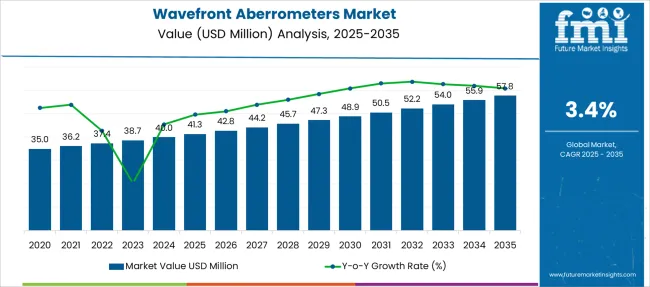
| Metric | Value |
|---|---|
| Wavefront Aberrometers Market Estimated Value in (2025 E) | USD 41.3 million |
| Wavefront Aberrometers Market Forecast Value in (2035 F) | USD 57.8 million |
| Forecast CAGR (2025 to 2035) | 3.4% |
The wavefront aberrometers market is expanding steadily as eye care providers increasingly adopt advanced diagnostic technologies for refractive error measurement. Enhanced precision in visual aberration detection has become critical for improving outcomes in corrective procedures. The rising prevalence of myopia worldwide has driven demand for accurate diagnostic tools capable of detailed eye mapping.
Continuous technological improvements have made wavefront aberrometers more accessible and user-friendly in clinical settings. Growing investments in ophthalmic equipment by hospitals and specialty eye care centers have broadened the availability of these devices.
Furthermore, increasing awareness about early vision correction and personalized treatment plans is contributing to market growth. Future developments are expected to focus on integration with laser surgery systems and portable diagnostic options. Segmental growth is projected to be led by Harmann-Shack wavefront aberrometers, myopia as the primary indication, and hospitals as the dominant end-user segment.
The market is segmented by Product Type, Indication, and End-User and region. By Product Type, the market is divided into Harmann-Shack wavefront aberrometer, Ray tracing wavefront aberrometer, and Tscherning wavefront aberrometer. In terms of Indication, the market is classified into Myopia, Hyperopia, Astigmatism, and Others. Based on End-User, the market is segmented into Hospitals, Ambulatory Surgical Centers, Specialized Clinics, and Diagnostic Laboratorie. Regionally, the market is classified into North America, Latin America, Western Europe, Eastern Europe, Balkan & Baltic Countries, Russia & Belarus, Central Asia, East Asia, South Asia & Pacific, and the Middle East & Africa.
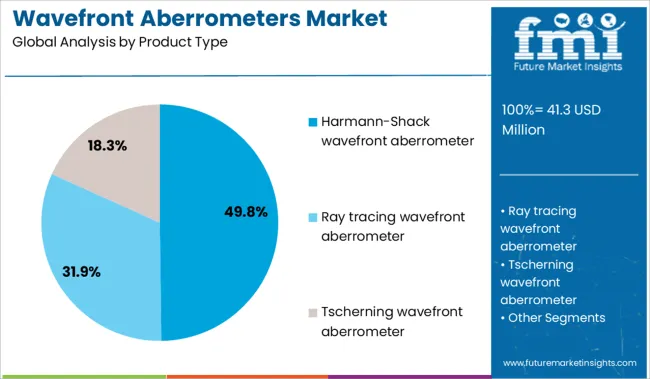
The Harmann-Shack wavefront aberrometer segment is expected to contribute 49.8% of the market revenue in 2025, establishing itself as the leading product type. The segment’s growth has been driven by the device’s high accuracy in capturing detailed wavefront aberrations, enabling customized refractive corrections. Eye care specialists have favored this technology for its ability to provide comprehensive ocular surface mapping and improve patient outcomes in refractive surgery and lens fitting.
Technological advances have enhanced device sensitivity and speed, making it a preferred choice in clinical diagnostics. Additionally, the Harmann-Shack system’s integration capability with other ophthalmic instruments has strengthened its adoption.
These factors collectively contribute to the sustained growth of this product segment.
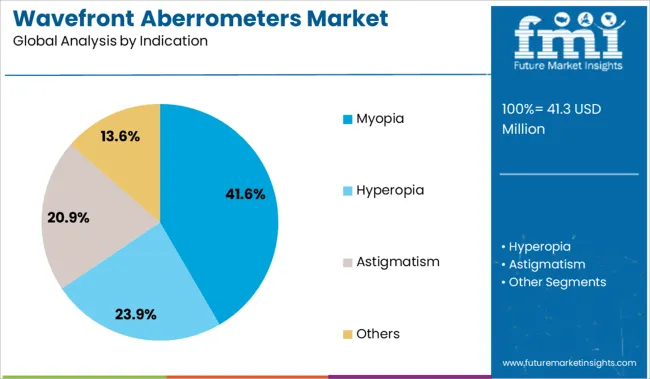
The Myopia segment is projected to hold 41.6% of the wavefront aberrometers market revenue in 2025, maintaining its position as the leading indication. The increasing global prevalence of myopia has created significant demand for accurate and early diagnostic solutions. Eye care professionals rely on wavefront aberrometry to detect subtle refractive errors and aberrations that standard tests might miss.
This has become particularly important in pediatric and young adult populations where myopia progression requires careful monitoring. The segment’s growth is also supported by heightened awareness of myopia control strategies and the rising adoption of personalized vision correction.
As the burden of myopia grows worldwide, demand for precise diagnostic devices is expected to increase, sustaining this segment’s leadership.
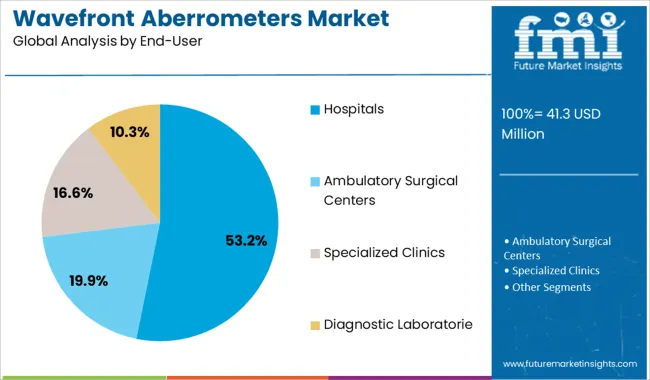
The Hospitals segment is expected to account for 53.2% of the wavefront aberrometers market revenue in 2025, reinforcing its role as the primary end-user. Hospitals have expanded investments in ophthalmic diagnostic equipment to support growing patient volumes and advanced vision correction procedures. The availability of skilled ophthalmologists and specialized eye care units in hospitals facilitates the adoption of sophisticated devices like wavefront aberrometers.
Moreover, hospitals benefit from integrated diagnostic workflows that improve patient throughput and treatment accuracy. Regulatory compliance and quality assurance protocols further encourage the use of precision diagnostic tools in hospital settings.
As eye care services continue to expand within healthcare systems, the Hospitals segment is expected to sustain its dominance in market revenue.
The wavefront aberrometer is used for diagnosing both lower and higher order of vision problems, such as comas and spherical aberrations, which are responsible for comets and halos around light foci. This method involves projecting a beam of light into the eye, reflecting back by the retina and further capturing it in the aberrometer.
A growing market for wavefront aberrometers is driven by the increased prevalence of eye disorders, a very similar device is sometimes referred to as an eye laser system, which is also used for refractive surgery. Wavefront aberrometers play an important role in the planning phase of eye surgery.
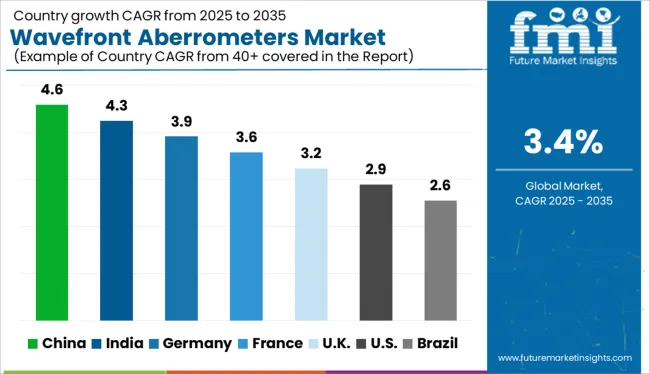
It is expected that North America will lead this market with a market share value of 33.9%. This is due to a stronger economy, better healthcare facilities, better government initiatives, and a higher level of business investments in research and development.
The increase in awareness of eye-related diseases and the growing aging population are likely to impact sales of wavefront aberrometers globally over the forecast period, although limited testing, inexperienced personnel, and inadequate equipment are some of the factors which may hinder the growth of the global wavefront aberrometers market overall.
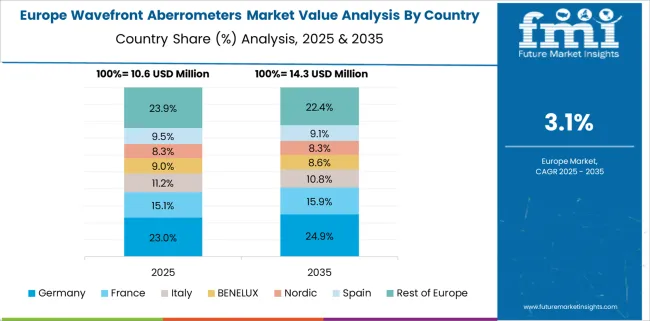
A growing awareness of eye diseases and increasing adoption of treatment are expected to result in Europe holding the second largest market share of 27.4%, followed by Latin America.
There is a growing demand for wavefront aberrometers, which are sometimes associated with eye laser systems used for refractive surgery during the planning stages of surgery. In addition, increased awareness about eye-related diseases and ageing populations requiring frequent medical check-ups are also expected to positively impact the wavefront aberrometers market.
Some of the leading companies operating in the global membrane filter cartridge market include Abbott Medical Optics Inc, Novartis AG, Carl Zeiss Meditec, Essilor instruments, Coburn Technologies, Inc., Luneau Technology USA, Inc., NIDEK CO., LTD, OPTIKON, SCHWIND eye-tech-solutions, US Ophthalmic and others.
For instance, in 2020, Oculus, Barrett Toric Calculator and Olsen released ray-tracing formulas to Pentacam AXL that allow them to take data on posterior and anterior corneal surface, thickness, and angle. These factors are expected to drive the growth of the wavefront aberrometer market. An article in the Journal of Clinical Ophthalmology found that LASIK surgery performed using a high-resolution aberrometer in a myopic patient resulted in quite successful outcomes.
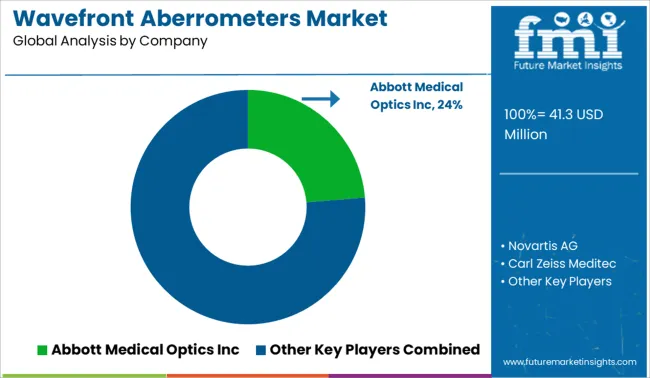
Some of the leading companies operating in the global wavefront aberrometers market include Abbott Medical Optics Inc, Novartis AG, Carl Zeiss Meditec, Essilor instruments, Coburn Technologies, Inc., Luneau Technology USA, Inc., NIDEK CO., LTD, OPTIKON, SCHWIND eye-tech-solutions, US Ophthalmic and others.
In 2020, when LASIK surgery was performed in a myopic patient using high-resolution aberrometers, the outcome of the surgery was quite successful, according to a study published in the Journal of Clinical Ophthalmology.
In addition, advancements in products related to wave-front aberrometer are expected to drive the market growth. For instance, in 2020, Oculus, Barrett Toric Calculator, and Olsen introduced the ray-tracing formula to Pentacam AXL. These new features take data regarding the posterior and anterior corneal surface and thickness. Hence, these factors are expected to drive the demand for wavefront aberrometer.
| Report Attribute | Details |
|---|---|
| Growth Rate | CAGR of 3.4% from 2025 to 2035 |
| Base Year for Estimation | 2024 |
| Historical Data | 2020 to 2024 |
| Forecast Period | 2025 to 2035 |
| Quantitative Units | Revenue in USD Million and CAGR from 2025-2035 |
| Report Coverage | Revenue Forecast, Volume Forecast, Company Ranking, Competitive Landscape, Growth Factors, Trends and Pricing Analysis |
| Segments Covered | Product Type, Indication, End User, Region |
| Regions Covered | North America; Latin America; Western Europe; Eastern Europe; Asia-Pacific; Japan; Middle East and Africa |
| Key Countries Profiled | USA, Canada, Brazil, Mexico, Germany, UK, France, Spain, Italy, Russia, Poland, Australia, New Zealand, China, India, Japan, GCC, South Africa, North Africa |
| Key Companies Profiled | Abbott Medical Optics Inc; Novartis AG; Carl Zeiss Meditec; Essilor instruments; Coburn Technologies, Inc.; Luneau Technology USA, Inc.; NIDEK CO., LTD, OPTIKON; SCHWIND eye-tech-solutions; US Ophthalmic; others |
| Customization | Available Upon Request |
The global wavefront aberrometers market is estimated to be valued at USD 41.3 million in 2025.
The market size for the wavefront aberrometers market is projected to reach USD 57.8 million by 2035.
The wavefront aberrometers market is expected to grow at a 3.4% CAGR between 2025 and 2035.
The key product types in wavefront aberrometers market are harmann-shack wavefront aberrometer, ray tracing wavefront aberrometer and tscherning wavefront aberrometer.
In terms of indication, myopia segment to command 41.6% share in the wavefront aberrometers market in 2025.






Our Research Products

The "Full Research Suite" delivers actionable market intel, deep dives on markets or technologies, so clients act faster, cut risk, and unlock growth.

The Leaderboard benchmarks and ranks top vendors, classifying them as Established Leaders, Leading Challengers, or Disruptors & Challengers.

Locates where complements amplify value and substitutes erode it, forecasting net impact by horizon

We deliver granular, decision-grade intel: market sizing, 5-year forecasts, pricing, adoption, usage, revenue, and operational KPIs—plus competitor tracking, regulation, and value chains—across 60 countries broadly.

Spot the shifts before they hit your P&L. We track inflection points, adoption curves, pricing moves, and ecosystem plays to show where demand is heading, why it is changing, and what to do next across high-growth markets and disruptive tech

Real-time reads of user behavior. We track shifting priorities, perceptions of today’s and next-gen services, and provider experience, then pace how fast tech moves from trial to adoption, blending buyer, consumer, and channel inputs with social signals (#WhySwitch, #UX).

Partner with our analyst team to build a custom report designed around your business priorities. From analysing market trends to assessing competitors or crafting bespoke datasets, we tailor insights to your needs.
Supplier Intelligence
Discovery & Profiling
Capacity & Footprint
Performance & Risk
Compliance & Governance
Commercial Readiness
Who Supplies Whom
Scorecards & Shortlists
Playbooks & Docs
Category Intelligence
Definition & Scope
Demand & Use Cases
Cost Drivers
Market Structure
Supply Chain Map
Trade & Policy
Operating Norms
Deliverables
Buyer Intelligence
Account Basics
Spend & Scope
Procurement Model
Vendor Requirements
Terms & Policies
Entry Strategy
Pain Points & Triggers
Outputs
Pricing Analysis
Benchmarks
Trends
Should-Cost
Indexation
Landed Cost
Commercial Terms
Deliverables
Brand Analysis
Positioning & Value Prop
Share & Presence
Customer Evidence
Go-to-Market
Digital & Reputation
Compliance & Trust
KPIs & Gaps
Outputs
Full Research Suite comprises of:
Market outlook & trends analysis
Interviews & case studies
Strategic recommendations
Vendor profiles & capabilities analysis
5-year forecasts
8 regions and 60+ country-level data splits
Market segment data splits
12 months of continuous data updates
DELIVERED AS:
PDF EXCEL ONLINE

Thank you!
You will receive an email from our Business Development Manager. Please be sure to check your SPAM/JUNK folder too.
Chat With
MaRIA